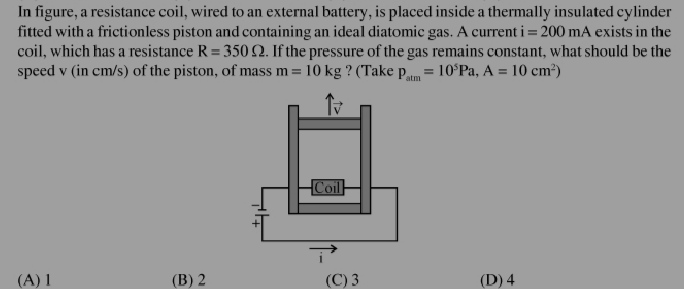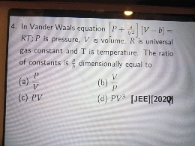JEE Class main Answered
In figure, a resistance coil, wired to an external battery is placed inside a thermally insulated cylinder find with a frictionless piston and containing an ideal diatomic gas A current = 200 ma exists in the coil which has a resistance R=350? If the pressure of the gas remains constant what should be the speed v (in cm/s of the piston of mass m=10kg)?

Asked by samarthghogare | 06 May, 2023, 11:17: AM
Let us assume the dissipated heat in the resistance coil is absorbed by the enclosed gas in the cylinder.
Rate of heat dissipation is
 ...................... (1)
...................... (1)where i is current through coil and Rc is resistance of coil .
For diatomic gas that is hetaed at constant pressure , heat dissipation is
 .............................. (2)
.............................. (2)where n is number of moles , Cp =(7/2) R is constant volume specific heat, R is universal gas constant and
(dT/dt) is rate of change of increase of temperature.
From eqn.(1) and eqn.(2), we get
 ......................... (3)
......................... (3)For ideal gas , we have

when pressure is kept constant , rate of change of volume is

Above expression can be written as
 ............................. (4)
............................. (4) where A is area of cross section of cylinder and dh/dt is rate of vertical displacement of piston with respect to time , i.e, (dh/dt) is speed of piston .
From eqn.(3) and (4) , we get speed of piston as


Speed of piston = 4 cm/s
Answered by Thiyagarajan K | 07 May, 2023, 21:54: PM
JEE main - Physics
Asked by rambabunaidu4455 | 03 Oct, 2024, 16:03: PM
JEE main - Physics
Asked by yashu22022006 | 25 May, 2024, 09:13: AM
JEE main - Physics
Asked by pataiyalalit02 | 19 May, 2024, 16:53: PM
JEE main - Physics
Asked by hridayjayaram085 | 12 Jan, 2024, 17:50: PM
JEE main - Physics
Asked by ashainy91829 | 06 Nov, 2023, 13:08: PM
JEE main - Physics
Asked by ghrushi3 | 02 Nov, 2023, 22:05: PM
JEE main - Physics
Asked by samarthghogare | 06 May, 2023, 11:17: AM
JEE main - Physics
Asked by aadityakumar0603 | 06 Mar, 2023, 22:03: PM
JEE main - Physics
Asked by manvirsingh2242 | 21 Jun, 2022, 16:35: PM


